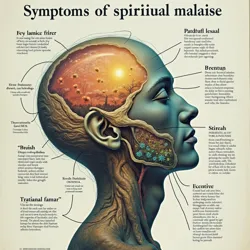Spiritual Malaise

Depicts a figure overwhelmed by spiritual malaise a condition characterized by existential weariness and disconnection.
post-cataclysmic condition
emptiness, lack of purpose, weariness
Aerion Lumina
Great Shattering
spiritmending
*spiritual malaise, often referred to in hushed tones as soul-sickness or the occuleric wasting*, is a pervasive condition afflicting a significant portion of the population in the aftermath of the Great Shattering. It is characterized by a profound sense of existential weariness, a draining of inner vitality, and a disconnection from the spiritual wellsprings that once nourished individuals and communities. Unlike physical ailments that are readily apparent, spiritual malaise is insidious, often manifesting as a constellation of emotional, psychological, and even subtle physical symptoms that erode well-being and resilience. The renowned spiritmender Aerion Lumina has dedicated his life to understanding and treating this condition, recognizing it as a critical impediment to recovery and rebuilding in the devastated landscapes of the Shattered Coast.
Nature and Manifestations
Core Characteristics
 Shows the multifaceted symptoms of spiritual malaise including emotional distress psychological struggles and physical manifestations.
Shows the multifaceted symptoms of spiritual malaise including emotional distress psychological struggles and physical manifestations.At its core, spiritual malaise is not merely sadness or grief, though these emotions are often present. It is a deeper, more fundamental depletion, akin to a slow leak in the vessel of the soul. Those afflicted describe a persistent feeling of emptiness, a lack of purpose or direction, and a diminished capacity for joy or engagement with life. The vibrant hues of the world seem muted, and the future, once a landscape of possibilities, appears as a barren and uninviting expanse. This condition transcends typical emotional distress, reaching into the very essence of a person's being, affecting their motivation, relationships, and overall sense of self.
One of the defining features of spiritual malaise is its pervasive nature. It is not confined to any particular demographic or social strata. Survivors of the Great Shattering from all walks of life, from hardened wasteland scavengers to sheltered enclave dwellers, are susceptible. The shared trauma of the cataclysm, coupled with the ongoing hardships of survival in a broken world, has created fertile ground for this condition to take root and spread. Even individuals who have managed to secure relative physical comfort and safety are not immune, as the spiritual wounds run deep, often invisible to the casual observer.
Symptomatic Spectrum
The symptoms of spiritual malaise are diverse and can vary significantly in presentation and intensity from person to person. However, certain recurring patterns and clusters of symptoms are frequently observed by healers and spiritmenders like Aerion. These can be broadly categorized into emotional, psychological, and physical manifestations, though it is important to recognize that these categories are interconnected and often influence one another.
Emotional and Affective Symptoms
Emotionally, spiritual malaise often presents as a persistent state of low mood, characterized by feelings of sadness, hopelessness, and despair. These feelings are not necessarily tied to specific events or triggers, but rather form a background hum of negativity that colors all experiences. Individuals may experience emotional numbness or detachment, finding it difficult to connect with others or to feel empathy. Irritability, anxiety, and a sense of pervasive unease are also common, reflecting an inner disharmony and a lack of spiritual equilibrium. The capacity for joy and pleasure is significantly diminished, and activities that once brought satisfaction may become joyless and burdensome.
Psychological and Cognitive Symptoms
Psychologically, spiritual malaise can manifest as a range of cognitive impairments and existential struggles. Difficulty concentrating, memory problems, and indecisiveness are frequently reported, reflecting a draining of mental energy and focus. A profound sense of meaninglessness and purposelessness is a hallmark symptom, as individuals grapple with the question of their place and value in a world that seems devoid of inherent order or justice. Nightmares, intrusive thoughts related to traumatic events, and a generalized sense of foreboding can further contribute to psychological distress. In severe cases, spiritual malaise can erode an individual's sense of identity and self-worth, leading to feelings of profound alienation and isolation.
Physical Manifestations
While spiritual malaise is not primarily a physical ailment, it can have significant repercussions on physical health and well-being. Chronic fatigue and lethargy are common complaints, reflecting the draining of vital energies. Sleep disturbances, including insomnia or hypersomnia, are also frequently reported, disrupting the body's natural restorative processes. Unexplained aches and pains, digestive issues, and a weakened immune system can further contribute to physical discomfort and vulnerability. In some cases, prolonged spiritual malaise can exacerbate pre-existing physical conditions or contribute to the development of new illnesses, highlighting the intricate link between spiritual and physical health.
It is crucial to note that these symptoms are not always present in every individual suffering from spiritual malaise, and the specific constellation of symptoms can vary widely. Furthermore, the condition can fluctuate in intensity, with periods of relative respite interspersed with episodes of heightened distress. This variability can make diagnosis challenging, requiring a nuanced and holistic approach that considers the individual's overall well-being and life circumstances.
Causative Factors
The Great Shattering and its Aftermath
 Illustrates the environmental devastation and social breakdown caused by the Great Shattering a key factor in spiritual malaise.
Illustrates the environmental devastation and social breakdown caused by the Great Shattering a key factor in spiritual malaise.The primary catalyst for the widespread spiritual malaise afflicting the Shattered Coast is undoubtedly the Great Shattering itself. This cataclysmic event, the precise nature of which remains shrouded in mystery and fragmented accounts, inflicted not only physical devastation but also a profound rupture in the spiritual fabric of the world. The sudden and overwhelming loss of life, the destruction of communities, and the collapse of established social structures created a collective trauma that continues to reverberate through the generations.
The Great Shattering is believed by many spiritual scholars to have caused a form of occuleric bleeding, a metaphorical or literal wounding of the spiritual plane itself. This concept suggests that the cataclysm released a surge of chaotic and disruptive energies that destabilized the subtle energetic balance of the world. This occuleric bleeding is thought to have left residual spiritual contamination, creating an environment that is inherently draining and detrimental to spiritual well-being. The pervasive sense of unease and spiritual sickness reported across the Shattered Coast is often attributed to this lingering occuleric imbalance.
Environmental Degradation and Resource Scarcity
The environmental devastation wrought by the Great Shattering further contributes to spiritual malaise. Vast swathes of land are now contaminated by pollutants, rendering them barren and inhospitable. Clean water and fertile soil are scarce resources, leading to constant struggles for survival and widespread food insecurity. The loss of natural beauty and the degradation of ecosystems have a profound psychological and spiritual impact, eroding the sense of connection to the natural world that is vital for human well-being.
The constant exposure to harsh and degraded environments, coupled with the daily grind of survival in resource-scarce conditions, takes a heavy toll on the spirit. Individuals are forced to prioritize immediate physical needs over spiritual and emotional nourishment, leading to a gradual depletion of inner resources. The lack of access to natural spaces and the absence of beauty in the surroundings further exacerbate feelings of isolation, despair, and spiritual disconnection.
Social Dislocation and Loss of Community
The Great Shattering shattered not only physical landscapes but also social structures and communities. Mass displacement, migration, and the breakdown of established governance have led to widespread social dislocation and fragmentation. Traditional support networks have been disrupted, and individuals are often left to fend for themselves in a chaotic and unpredictable world. The loss of community, belonging, and social cohesion is a significant contributing factor to spiritual malaise.
Humans are inherently social beings, and strong community bonds are essential for emotional and spiritual well-being. In the absence of supportive social structures, individuals are more vulnerable to isolation, loneliness, and feelings of alienation. The constant struggle for survival in a competitive and often hostile environment further erodes trust and cooperation, creating a cycle of social breakdown and spiritual depletion. The lack of shared rituals, traditions, and collective purpose further exacerbates the sense of meaninglessness and existential despair that characterizes spiritual malaise.
Traumatic Experiences and Unresolved Grief
The Great Shattering and its aftermath have subjected countless individuals to traumatic experiences, including loss of loved ones, violence, displacement, and witnessing horrific events. These traumas leave deep scars on the psyche and spirit, often leading to unresolved grief, post-traumatic stress, and a sense of shattered innocence. Unprocessed trauma and grief are significant contributors to spiritual malaise, as they create energetic blockages and emotional wounds that impede the flow of vital life force.
Traumatic experiences can fragment the soul, leading to a sense of incompleteness and disconnection from one's own inner resources. Unresolved grief can weigh heavily on the spirit, creating a persistent sense of sadness and loss that drains vitality and joy. The cumulative effect of multiple traumas and losses can be particularly devastating, leading to a profound sense of spiritual exhaustion and a diminished capacity for healing and recovery. The pervasive nature of trauma in the post-Shattering world makes it a central factor in the widespread prevalence of spiritual malaise.
Impact on Individuals and Communities
Individual Suffering and Diminished Functioning
Spiritual malaise has a profound impact on the lives of individuals, diminishing their overall well-being and capacity for functioning. The persistent emotional distress, psychological struggles, and physical symptoms associated with the condition can significantly impair daily life. Individuals may struggle to maintain employment, care for themselves or their families, and engage in meaningful social interactions. Motivation and energy levels are often severely depleted, making it difficult to pursue goals, maintain routines, or even perform basic tasks.
The erosion of spiritual vitality can also lead to a decline in physical health, as the body's natural healing mechanisms are weakened. Individuals suffering from spiritual malaise are more susceptible to illness, injury, and chronic health problems. The diminished sense of purpose and meaning can also contribute to self-destructive behaviors, such as substance abuse or reckless risk-taking, further exacerbating their suffering and diminishing their life prospects.
Social and Communal Consequences
The widespread prevalence of spiritual malaise has significant social and communal consequences, hindering the recovery and rebuilding efforts in the Shattered Coast. A population plagued by soul-sickness is less resilient, less productive, and less capable of collective action. Spiritual malaise can erode social cohesion, trust, and cooperation, making it more difficult to establish stable communities and address shared challenges.
The lack of motivation and engagement associated with spiritual malaise can lead to social apathy and disengagement, hindering community initiatives and collective projects. The emotional distress and psychological struggles can contribute to social unrest, conflict, and a breakdown of social order. In communities where spiritual malaise is rampant, there may be a decline in civic participation, volunteerism, and mutual support, further weakening the social fabric and impeding progress towards recovery.
Economic and Infrastructural Rebuilding
Spiritual malaise also poses a significant obstacle to economic and infrastructural rebuilding in the Shattered Coast. A workforce depleted by soul-sickness is less productive and less innovative, hindering economic growth and development. The lack of motivation and energy can slow down rebuilding efforts, delaying the restoration of essential infrastructure and services. The psychological and emotional toll of spiritual malaise can also lead to increased healthcare costs and social welfare burdens, further straining already limited resources.
The long-term economic and social recovery of the Shattered Coast is inextricably linked to addressing the pervasive issue of spiritual malaise. Investing in spiritual healing and well-being is not merely a matter of individual compassion but a crucial step towards fostering a resilient, productive, and thriving society capable of overcoming the challenges of the post-cataclysmic world.
Spiritmending as a Response
Aerion Lumina's Approach
 Presents spiritmending as a practice to restore spiritual balance and vitality in individuals and communities affected by malaise.
Presents spiritmending as a practice to restore spiritual balance and vitality in individuals and communities affected by malaise.Recognizing the profound impact of spiritual malaise, individuals like Aerion Lumina have emerged as vital figures in the Shattered Coast, offering healing and solace to those afflicted. Aerion's practice of spiritmending is specifically tailored to address the unique spiritual wounds caused by the Great Shattering and the ongoing hardships of survival. His approach is holistic, recognizing the interconnectedness of the spiritual, emotional, psychological, and physical dimensions of well-being.
Aerion's spiritmending techniques, rooted in Silvanesti lineage traditions but adapted to the post-cataclysmic world, aim to restore balance, vitality, and resilience to the spiritual essence of individuals and communities. He utilizes a range of practices, including soleric weaving, spiritual cleansing, soul retrieval, and nature-based therapies, to address the multifaceted manifestations of spiritual malaise. His compassionate and individualized approach has earned him renown throughout the Shattered Coast as a beacon of hope and healing.
Principles of Spiritmending for Malaise
Spiritmending, as practiced by Aerion and other healers, offers a pathway to recovery from spiritual malaise by addressing its underlying causes and manifestations. The core principles of spiritmending in this context include:
-
occuleric rebalancing: Spiritmending seeks to counteract the effects of occuleric bleeding and restore balance to the spiritual environment. This involves techniques to cleanse residual spiritual contamination, harmonize disruptive energies, and re-establish a sense of spiritual equilibrium. Soleric weaving plays a crucial role in this process, channeling vital life force to revitalize depleted spiritual energies and mend frayed occuleric connections.
-
Trauma Resolution and Grief Processing: Spiritmending recognizes the central role of trauma and unresolved grief in spiritual malaise. Techniques such as soul retrieval and spiritual counseling are employed to help individuals process traumatic experiences, reintegrate fragmented soul parts, and navigate the complex landscape of grief and loss. Creating safe spaces for emotional expression and providing compassionate support are essential components of this process.
-
Community Reconnection and Social Healing: Spiritmending extends beyond individual healing to address the communal dimensions of spiritual malaise. Group rituals, community ceremonies, and restorative justice practices are utilized to foster social cohesion, rebuild trust, and promote collective healing. Strengthening community bonds and fostering a sense of shared purpose are crucial for overcoming the social dislocation and fragmentation that contribute to soul-sickness.
-
Nature Reconnection and Environmental Harmony: Recognizing the profound spiritual impact of environmental degradation, spiritmending emphasizes the importance of reconnecting with the natural world and restoring environmental harmony. Nature-based therapies, such as spending time in natural settings, utilizing plant medicines, and engaging in ecological restoration practices, are integral to the healing process. Re-establishing a harmonious relationship with nature is seen as vital for spiritual replenishment and overall well-being.
Efficacy and Limitations
While spiritmending has shown significant promise in alleviating the symptoms of spiritual malaise and promoting healing, it is important to acknowledge both its efficacy and limitations. Anecdotal evidence and testimonials from individuals who have received spiritmending suggest that it can be effective in reducing emotional distress, improving psychological well-being, and enhancing overall vitality. Many report a renewed sense of purpose, increased energy levels, and a greater capacity for joy and engagement with life following spiritmending interventions.
However, rigorous scientific studies on the efficacy of spiritmending are lacking, and its mechanisms of action are not fully understood from a conventional scientific perspective. Furthermore, spiritmending is not a panacea, and its effectiveness can vary depending on the severity and complexity of the individual's condition, as well as their willingness to engage in the healing process. In some cases, spiritual malaise may be deeply entrenched and require prolonged and intensive spiritmending interventions, potentially in conjunction with other forms of support and therapy. It is also important to recognize that spiritmending operates within a specific cultural and spiritual paradigm, and its effectiveness may be influenced by individual beliefs and receptivity to shamanic healing practices.
Relationship to Mundane Psychological Conditions
Spiritual malaise, as described in the context of the Shattered Coast, shares certain overlapping characteristics with psychological conditions recognized in the world prior to the Great Shattering, such as depression, post-traumatic stress disorder (PTSD), and existential despair. However, it is crucial to recognize that spiritual malaise is not simply a re-labeling of these mundane conditions. It represents a distinct phenomenon shaped by the unique circumstances of the post-cataclysmic world and rooted in a different understanding of human well-being that encompasses spiritual dimensions beyond the purely psychological.
While mundane depression and PTSD may share symptoms such as low mood, fatigue, and cognitive impairments with spiritual malaise, the latter is distinguished by its emphasis on the spiritual dimension of suffering and its connection to the broader occuleric environment. Spiritual malaise is understood as a disruption of spiritual balance and vitality, often stemming from occuleric wounds and environmental disharmony, in addition to psychological and emotional factors. Spiritmending, therefore, addresses these spiritual dimensions directly, utilizing techniques that go beyond conventional psychological or medical interventions.
Existential despair, which involves a profound sense of meaninglessness and purposelessness, is perhaps the closest mundane analogue to certain aspects of spiritual malaise. However, even in this case, spiritual malaise is broader, encompassing not only existential angst but also a range of emotional, psychological, and physical symptoms rooted in a perceived spiritual depletion or wounding. Spiritmending offers a framework for addressing existential despair by reconnecting individuals with their spiritual sources of meaning and purpose, and by restoring a sense of inherent value and belonging within the cosmos.
In essence, spiritual malaise can be understood as a post-cataclysmic syndrome that incorporates elements of mundane psychological distress but transcends them by emphasizing the spiritual consequences of the Great Shattering and the need for holistic healing approaches that address the spiritual, as well as the psychological and physical, dimensions of human suffering. Spiritmending represents a culturally specific and contextually relevant response to this unique condition, drawing upon ancient traditions and adapting them to the challenges of a profoundly changed world.